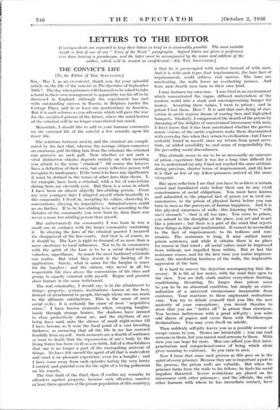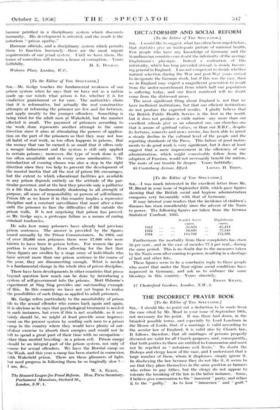LETTERS TO THE EDITOR
(Correspondents are requested to keep their letters as brief as is reasonably possible. The most suitable length is that of one of our " News of the Week " paragraphi. Signed letters are given a preference ever those bearing a pseudonym, and the latter must be accompanied by the name and address of the author, which will be treated as confidential.—Ed. THE SPECTATOR.] Stn,—fay I, as an ex-convict, thank you for your splendid article on the life of the convict in The Spectator of September 18th? The day when prisoners will themselves be asked to take a hand in their own management is apparently too far off to be discussed in England—although the experiment has met with outstanding success in Russia, in Belgiuin (under the Cottage Plan), and in at least one penitentiary in America: But it is such reforms as you advocate which will pai-e the way for the socialised prisons of the future, where the mind-lesions of the criminal will be no longer exacerbated but cured.
Meanwhile, I should like to add to your humane comments on the external life of the convict a few remarks upon his inner life.
The relations between society and the criminal are compli- cated by the fact that, whereas the average citizen conceives an enormous gulf dividing him from the criminal, the criminal can perceive no such gulf. Now whether or not such a vital distinction obtains depends entirely on what meaning you attach to the term " criminal." Of course the lawyers have a definition of their own, but every reflective person will recognise its inadequacy. If the term is to have any significance it must be defined in the terms of other laws than theirs. I, for example, have been a criminal, with a list of convictions dating from eleventh year. But there is a sense in which I haVe'been au almost abjectly law-abiding person. From my i-ery youngest days I adapted myself whole-heaitedly to the community I lived in, accepting its values,. observing its conventions, obeying its imperatives. Submissiveness could go no ftirther. If to be law-abiding is to act according to the dietatei of the community 'you were horn in, then there was never a more law-abiding person than myself.
But unfortunately the community I was born in was a small one at variance with the larger community containing it. In obeying the laws of the criminal quarter I incurred the disapprotral of the law-courts. And that is, of course, as it should be. The Law is right to demand of us more than a mere obedience to local influences. Not to be in communion with the spirit of the Law is to be a .social dead-weight, valueless, superfluous. So much the most hardened criminals can realise. But what they resent is the limiting of its application. Surely, what is sauce for the burglar is sauce for the burgher ; and the citizen, who never in all his respectable life rises above the conventions of his class and group, is equally criminal with myself. Rogue and peasant slave feature in the same indictment.
The real criminality, I should say, is in the attachment to things—property, systems, institutions—barren at the best, instead of attachment to people, through whom one can reach to the ultimate satisfactions. This is the milk of most social evils ; it is certainly the cause of most " acquisitive crime." I have known moments when, creeping burglar- iously through strange houses, the shadows have seemed to close protectively about me, and the rhythms of my being have sunk unto the silence of small night-noises till I have become as it were the focal point of a vast brooding darkness, so menacing that all the life in me has cowered fearfully from myself. Such moments are a dearth of sentience so near to death that the repossession of one's body_ by the living forces has been vivid as a re-birth, full of a thankfulness that one is no longer a part of the encroaching universe of things. To have felt oneself the agent of all that is malevolent and cruel is no pleasant experience, even for a burglar ; and I have come away from such episodes hating the very boOty I carried, and-grateful even for the sight of a living policeman on his rounds.
The true fault of the thief; then (I confine my remarks to offenders against property, because such- offenders number at least three-quarters of the prison-population of this country);. is that he is preoccupied with matter instead of with men. And it is with such types that imprisonment, the bare fact of imprisonment, could achieve real success. The bars are unrelenting, the walls lower an everlasting menace. And from such dearth men turn to their own kind.
I may instance my own case. I was bred in an environment which concentrated the vague, diffused materialism of the modern world into a stark and uncompromising hunger for money. Accepting these values, I went to prison ; and in prison I lost them. How ? It is said that men dying of star- vation in arctic regions dream of roaring fires and high-piled banquets. Similarly, I compensated the dearth of the prison by dreaming of the delights of unrestrained intercourse with men. I don't know that it has been ascertained whether the gastro- nomic visions of the arctic explorers make them discontented with everyday fare when they return to civilisation : but I have certainly found in myself, since my return from penal servi- tude, an added sensibility to, and sense of responsibility for, the prevailing social discordanees.
This attitude seems to me to be so necessarily an outcome of prison experience that it was for a long time difficult for me to understand (a) why I had not reached the same attitude during- previous, shorter terms of imprisonment, and (b) how it is that so few of my fellow-prisoners arrived at the same viewpoint.
But upon reflection I see that you have to achieve a certain cowed and humiliated state before there can be any vivid: consciousness of social obligations. You must have known and submitted to the physical fact of prison (or in civil cir cumstances, to the prison of physical facts) before you can turn to men as the purveyors of human happiness. And it is this physical awareness of walls—this knoving them " with one's stomach "—that is all too rare. You come to prison, you submit to the discipline of the place, you act and re-act like a prisoner ; but there is a part of the mind that rejects
these things as false and insubstantial. It cannot be reconciled •
to the fact of imprisonment, to its tediums and con- straints. The resistance is long, it may outlast many prison sentences, and while it obtains there is no place for reason in that mind ; all social values must be iinpressed from without, not impelled from within. But at last the resistance ceases, and for the first time you realise imprison- ment, the unrelenting hardness of the walls, the implacable aggression of the bars.
It is hard to convey the dejection accompanying that dis- covery. It is life at low water, with the mud flats open to the view. You see dull, stark matter everywhere limiting, conditioning, thwarting. No longer does prison seem to you to be an abnormal condition, but simply an exter- nalisation of a universal circumstance inseparable from existence. Your reactions to these unpleasant realisations vary. You try to delude yourself that you like the new austerity of your conceptions ; you invent theories to show that you are " better off " in prisdn than elsewhere. You become lachrymose with a great self-pity : you seize odd sheets of papers and cover them with Wertheresq'ue declamations. You may even dwell on suicide.
Then suddenly self-pity leaves you as a possible avenue of escape comes to you. Stones are intractable ; you can read sermons in them, but you cannot read sermons to them. With • . • •
men you can hope for more. Men can afford you that inter7 penetration and comprehensiveness of being which alone gives meaning to existence. So you turn to then.
Now I know that some such process as this goes on in the spirit of every prisoner. ,Becanse they are so important a part in the process, the prison walls are valuable. But when the prisoner turns from the walls to his fellows, he finds his social impulses thwarted. Severe -restrictions are placed on his intercourse with other prisoners ; and the officials, the only other humans with whom he has immediate contact, have become petrified in a disciplinary system which discounts humanity. His development is arrested, and the result is the notorious " prison apathy." • Humane officials,, and a disciplinary system which permits them to function humanely—these are the most urgent requirements of our penal system. Until we have them, the house of correction will remain a house of corruption.—Yours Woburn Place; London, W.C.











































 Previous page
Previous page